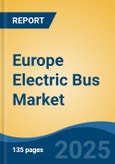Speak directly to the analyst to clarify any post sales queries you may have.
10% Free customizationThis report comes with 10% free customization, enabling you to add data that meets your specific business needs.
Governments are setting aggressive emission reduction targets and encouraging public transport operators to shift from diesel fleets to electric alternatives through subsidies and low-emission zones. The evolution of battery technology has significantly enhanced energy density, reduced charging times, and lowered operational costs, making electric buses a more practical and attractive option for urban and intercity travel. Increasing consumer awareness about climate change and the pressure to decarbonize transportation networks are further pushing municipalities and private operators to invest in clean mobility solutions.
Market Drivers
Regulatory Push for Low-Emission Transport
Environmental regulations mandating the reduction of greenhouse gas emissions in public transport are propelling the shift toward electric buses. Governments and environmental agencies are enforcing stringent rules against fossil fuel-powered vehicles, prompting public transport authorities and private fleet operators to adopt zero-emission alternatives. Policies such as low-emission zones, bus fleet electrification mandates, and emission-linked taxation frameworks are making diesel buses economically and operationally less viable. Regulatory compliance is no longer optional, with timelines imposed to phase out older combustion engine fleets.Financial penalties for non-compliance, coupled with incentives for clean fleet adoption, are further tipping the scale. These regulatory frameworks not only influence procurement but also reshape long-term operational strategies. Municipal transport networks are required to align with broader environmental targets, pushing them to prioritize electric buses in their fleet renewal cycles.
This consistent legislative backing provides market certainty, attracting OEM investments and infrastructure development tailored toward electric mobility. For instance, in 2024, nearly 49% of new city buses sold in the EU were zero-emission, with 46% battery-electric and 3% hydrogen fuel cell. Countries like the Netherlands, Finland, and Norway reached over 90% electric bus sales, while Spain and the UK surpassed 50%. Hydrogen buses made up only 3% of new sales, showing Europe's rapid shift away from diesel toward cleaner public transport.
Key Market Challenges
High Initial Capital Investment
The absence of a widespread, reliable charging infrastructure significantly hampers the operational scalability of electric bus fleets. Unlike traditional fueling stations, electric charging requires significant planning, real estate, and coordination with utility providers. Many cities lack the electrical grid capacity to support high-volume simultaneous charging, especially in densely populated areas. Depot charging systems often require expensive upgrades, including transformers, switchgear, and smart load management tools. Fast-charging stations installed along routes are constrained by space, permitting, and connectivity issues. Peak-time grid overload risks can disrupt charging cycles, delaying departures and affecting route schedules.Key Market Trends
Shift Toward Modular Battery Systems
Modular battery architecture is becoming increasingly prevalent in electric bus design, allowing for flexible energy storage configurations tailored to operational needs. Unlike fixed battery packs, modular systems enable fleet operators to scale battery capacity based on route length, passenger volume, and climate conditions. This customization helps reduce excess weight and optimize energy consumption per kilometer. Modular setups simplify maintenance by allowing technicians to replace faulty modules instead of entire battery packs, reducing downtime and cost. These systems also support phased upgrades, enabling operators to integrate newer battery chemistries as they become available, without replacing the whole vehicle.Key Market Players
- Solaris Bus & Coach sp. z o.o.
- IVECO S.p.A.
- MAN Truck & Bus SE
- Scania AB
- AB Volvo
- EvoBus GmbH (Setra)
- VDL Bus & Coach BV
- BYD Auto Co., Ltd.
- Alexander Dennis Limited
- Irizar Group
Report Scope:
In this report, the Europe Electric Bus Market has been segmented into the following categories, in addition to the industry trends which have also been detailed below:Europe Electric Bus Market, By Battery Type:
- Lithium-ion
- Nickel-metal hydride battery (NiMH)
- Others
Europe Electric Bus Market, By Battery Capacity:
- Below 100 kWh
- 100-200 kWh
- 201-300 kWh
- above 300 kWh
Europe Electric Bus Market, By Length:
- 6-8m
- 8-10m
- 10-12m
- Above 12m
Europe Electric Bus Market, By Seating Capacity:
- Up to 30
- 31-40
- 41-50
- Above 50
Europe Electric Bus Market, By Propulsion:
- Battery Electric Bus
- Plug-in Hybrid Electric Bus
- Fuel Cell Electric Bus
Europe Electric Bus Market, By Country:
- France
- United Kingdom
- Italy
- Germany
- Spain
- Belgium
- Switzerland
- Netherlands
Competitive Landscape
Company Profiles: Detailed analysis of the major companies present in the Europe Electric Bus Market.Available Customizations:
With the given market data, the publisher offers customizations according to the company’s specific needs. The following customization options are available for the report.Company Information
- Detailed analysis and profiling of additional market players (up to five).
This product will be delivered within 1-3 business days.
Table of Contents
Companies Mentioned
- Solaris Bus & Coach sp. z o.o.
- IVECO S.p.A.
- MAN Truck & Bus SE
- Scania AB
- AB Volvo
- EvoBus GmbH (Setra)
- VDL Bus & Coach BV
- BYD Auto Co., Ltd.
- Alexander Dennis Limited
- Irizar Group
Table Information
| Report Attribute | Details |
|---|---|
| No. of Pages | 135 |
| Published | July 2025 |
| Forecast Period | 2024 - 2030 |
| Estimated Market Value ( USD | $ 2.12 Billion |
| Forecasted Market Value ( USD | $ 4.84 Billion |
| Compound Annual Growth Rate | 14.7% |
| Regions Covered | Europe |
| No. of Companies Mentioned | 10 |









